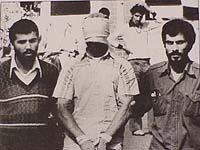Military strikes have a poor track record as a way to rescue hostages, leaving Britain with little choice but to ratchet up diplomatic and economic pressure as it tries to free 15 sailors and marines seized by Iran last week.
Prime Minister Tony Blair is under increasing pressure to act more forcefully after a leading British newspaper slammed the early response to the Iranian seizure as "pusillanimous."
British diplomats pressed ahead yesterday for a U.N. statement "deploring" the seizure and calling for the immediate release of the detainees. British Foreign Secretary Margaret Beckett also has appealed for support from Britain's partners in the European Union and from allies in the Middle East, including Saudi Arabia and Oman.
"Blair's preference, indeed best hope, is probably the U.N.," said Simon Henderson, director of the Persian Gulf and energy policy program at the Washington Institute for Near East Policy, in an analysis of the standoff.
Military analysts say history suggests that neither a surgical strike nor a massive military retaliation has a high likelihood of achieving the primary objective of freeing the hostages.
A U.S. Special Forces mission to rescue the more than 50 American hostages seized in the 1979 takeover of the U.S. Embassy in Iran misfired disastrously, contributing to the political downfall of President Carter.
Tracy Dove, a professor of history and international relations at the University of New York in Prague, points to a more recent example: Israel's 34-day war in Lebanon last summer.
For all the damage inflicted on fighters of the militant Shi'ite Hezbollah movement during the war, Israel never managed to win the freedom of two Israeli soldiers whose capture in a cross-border raid ignited the conflict.
"War conducted for the sake of liberating hostages rarely achieves its objectives, so this is not an option, despite the rhetoric," Mr. Dove said.
Mr. Blair told a British television interviewer yesterday that London has a "whole series of measures we can take," both at the United Nations and within the European Union, to pressure Iran.
"I'm not interested in confrontation for its own sake," he added, "The most important thing is to get the 15 personnel back safe and sound."
Britain, which has diplomatic relations with Tehran, has frozen bilateral contacts in the wake of the seizure, but a full rupture of formal ties is considered unlikely for the moment.
Former Foreign Secretary Malcolm Rifkind, speaking in the House of Commons this week, said Britain should pressure its European allies, many with extensive energy and trade ties to Iran, to suspend or cancel export credits to Iran.
The Bush administration has strongly backed Britain in the crisis, which erupted while the United States was beefing up its naval presence in the region. The United States also is pressing Tehran to suspend its suspect nuclear programs and has put out tentative diplomatic feelers to Iran over stabilizing the security situation in Iraq.
Undersecretary of State R. Nicholas Burns told a Senate Foreign Relations Committee hearing yesterday that the captured British sailors and marines were "entirely innocent" and were not operating in Iranian waters, as Tehran charges.
But, Mr. Burns added, "We are most definitely on a diplomatic track [with Iran]. We do not believe that conflict is inevitable."
Despite intense press speculation, Iran has denied any link between the capture of the British servicemen and five Iranians seized by U.S. forces in the Iraqi city of Irbil in January. Iran claims the five were diplomats, but U.S. military officials say they have evidence the Iranians were actively supporting militants.
A senior U.S. official, briefing reporters in London on background yesterday, said London and Washington were united in rejecting any prisoner swap.
"I don't think it's ever a good thing to create exchanges of hostages," the official said, according to a Reuters news agency report. |
 Iran says the 15 British sailors and marines it detained last week are healthy and have been treated in a humane manner. Iran's Foreign Ministry spokesman Mohammad-Ali Hosseini said on Tuesday that the 26-year-old female sailor, Faye Turney, had been provided privacy, adding, "All moral codes have certainly been observed."
Iran says the 15 British sailors and marines it detained last week are healthy and have been treated in a humane manner. Iran's Foreign Ministry spokesman Mohammad-Ali Hosseini said on Tuesday that the 26-year-old female sailor, Faye Turney, had been provided privacy, adding, "All moral codes have certainly been observed." 
 LONDON (Reuters) - British operations aimed at preparing for the handover of security in Iraq's southern province of Basra to Iraqi authority could be completed in the next few weeks, Prime Minister Tony Blair said on Wednesday.
LONDON (Reuters) - British operations aimed at preparing for the handover of security in Iraq's southern province of Basra to Iraqi authority could be completed in the next few weeks, Prime Minister Tony Blair said on Wednesday. Australia has no plans for setting a timeline for the withdrawal of its troops from Iraq, Defense Minister Brendan Nelson said Thursday.
Australia has no plans for setting a timeline for the withdrawal of its troops from Iraq, Defense Minister Brendan Nelson said Thursday.  Iraqi President Jalal Talabani told
Iraqi President Jalal Talabani told